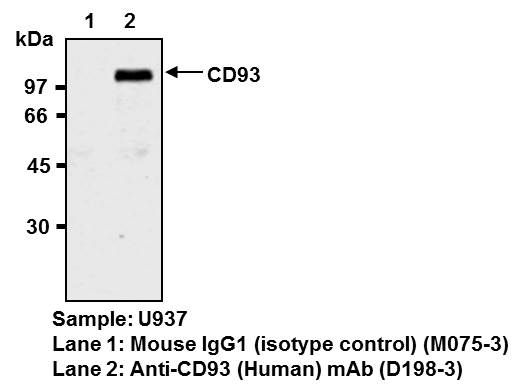Antibody detailed product information
| Code No. | D198-3 | |
| Anti-CD93 (Human) mAb | ||
| Price | ¥46,200 | |
| Size | 100 µL (1 mg/mL) | |
| Availability (in Japan) | 10 or more
(In Japan at 00:05, Apr 19, 2024 in JST) |
|
| Clonality | Monoclonal | |
| Clone | mNI-11 | |
| Isotype (Immunized Animal) |
Mouse IgG1 | |
| Applications | IP 2 µg/400 µg of cell extract from 5x106 cells FCM 5 µg/mL (final concentration) IH 10 µg/mL (Can be used in cryosections.) Co-IP* reported. (PMID: 29763414) |
|
| Immunogen (Antigen) |
LPS-stimulated U937 | |
| Reactivity [Gene ID] | Human[22918] |
|
| Storage buffer | 1 mg/mL in PBS/50% glycerol, pH 7.2 | |
| Storage temp. | -20°C | |
| Conjugate | Unlabeled | |
| Manufacturer | MBL | |
| Alternative names | C1qRp | |
| Background | CD93, also known as C1qRp, is a 100-125 kDa type I membrane protein that is a receptor for the complement protein C1q. CD93 has also been shown to act as a receptor for mannose-binding lectin and surfactant protein A. CD93 is expressed on the surface of monocytes, granulocytes, and endothelial cells, and expression is increased by TNF-α or GM-CSF. CD93 is involved in ligand-mediated enhancement of phagocytosis and intercellular adhesion. | |
| Related products | D198-5 Anti-CD93 (Human) mAb-PE |
|
| Product category | Research area:Cell surface antigens | |
| Data |    |
|
| Citations | Western Blotting
Co-IP
Flow Cytometry
Immunocytochemistry
|
|
| References |
|
|
- The availability is based on the information in Japan at 00:05, Apr 19, 2024 in JST.
- The special price is shown in red color.
- Please note that products cannot be ordered from this website. To purchase the items listed in this website, please contact us or local distributers.
- Abbreviations for applications:
WB: Western Blotting, IH: Immunohistochemistry, IC: Immunocytochemistry, IP: Immunoprecipitation
FCM: Flow Cytometry, NT: Neutralization, IF: Immunofluorescence, RIP: RNP Immunoprecipitation
ChIP: Chromatin Immunoprecipitation, CoIP: Co-Immunoprecipitation
DB: Dot Blotting, NB: Northern Blotting, RNA FISH: RNA Fluorescence in situ hybridization - For applications and reactivity:
*: The use is reported in a research article (Not tested by MBL). Please check the data sheet for detailed information.
**: The use is reported from the licenser (Under evaluation or not tested by MBL).
- For storage temparature: RT: room temparature
- Please note that products in this website might be changed or discontinued without notification in advance for quality improvement.
 Copyright (C)2015 Medical & Biological Laboratories Co., Ltd. All Rights Reserve
Copyright (C)2015 Medical & Biological Laboratories Co., Ltd. All Rights Reserve